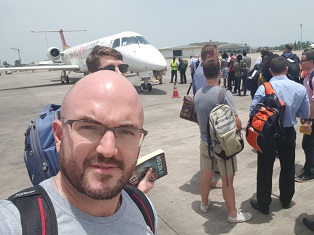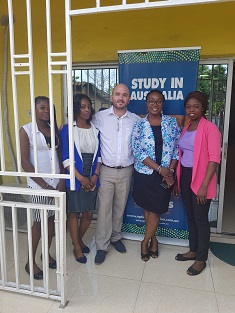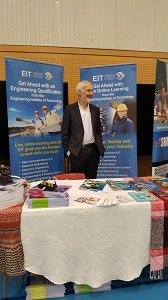Exhibitions
- Details
- Written by: Ruth Kennedy
We had a very good response to the seminar which the Engineering Institute of Technology ran in Midrand, South Africa, on the 19th June.
During the
The theme of the presentation, in a nutshell, was the disruption being caused by the increasingly digital/automated world. The topic may have been confronting
- Details
- Written by: Quintus Potgieter
The Engineering Institute of Technology took part in the 2018 Future Unlimited West African Education Exhibition in April. The exhibition was organized by the Australian Trade and Investment Commission. Its aim was to give Australian education providers the opportunity to promote their course offerings to prospective students in Africa. The attendees were a mixture of younger students interested in undergraduate diplomas and degrees, and graduates wanting to embark on further studies.
The exhibition took place in Lagos and Abuja in Nigeria, and in Ghana’s capital city Accra. David Gadjus, EIT’s International Education Manager for Africa and South America, chatted to students about the educational opportunities our college offers those with a passion for engineering. He was able to apprise them of both the online and on campus options for study, and indeed encouraged them to consider a combination of both.
those with a passion for engineering. He was able to apprise them of both the online and on campus options for study, and indeed encouraged them to consider a combination of both.
Starting the journey in Lagos, David found that many Nigerian students were either critical, or at least skeptical, of online education. He heard tales of colleges pushing unaccredited courses onto young Nigerian, with profits their sole motivation.
Something else he noted with interest was that the legitimate education institutions in Nigeria are predominantly polytechnic universities and TVET colleges, rather than those offering higher education options.
EIT, on the other hand, offers African students (and indeed students throughout the world) the opportunity to gain BSc Degrees in a range of engineering disciplines with the added option to complete engineering Master Degrees. These are accredited by the Australian Government and by globally-based engineering bodies which are signatories to the Sydney and Washington accords.
According to the Australian Trade and Investment Commission, Nigeria’s demand for education is outstripping the capacity of their local education institutions. Diploma graduates are increasingly considering further higher education opportunities abroad, as are the new crop of school leavers.
During David’s trip, he met with engineering councils, companies, agencies and universities in both Nigeria and Ghana. They all expressed the belief that African students are hungry for sound qualifications in higher education. Since 2012 Nigeria has seen the numbers of Nigerians studying abroad grow fourfold. Gadjus says:
“In Nigeria, each year, there is a need for 1.5 million placements in universities, but only a third of that is made available to them. There is a pool of a million students that need better opportunities.”
The Engineering Institute of Technology has been providing engineering education to students in Southern Africa for many years now and is increasingly securing a larger footprint in Africa. As newer technologies are embedded in Africa, the chance to educate and train the next generation of great African engineers, both in their country and abroad, becomes more of a reality.
The outlook for the future of education in Africa, despite its historical shortcomings, is looking more positive.
Studying abroad
EIT offers excellence in education, with qualifications which are widely accredited, to allow students some mobility globally. Apart from the option of acquiring these qualifications from home, via EIT’s live and interactive online platform of learning, students can also apply to study on-campus in Perth, Western Australia.
Moving on to Abuja, Nigeria, David met with the African University in Bayelsa State, just north of Port Harcourt in the South of Nigeria. They are preparing to open their Faculty of Engineering within the university and hope to have everything in place by September. He also met with experts actively working on engineering courses to be run in Rwanda.
David was gratified to see the energy of the people behind the education institutions perfecting and refining engineering education and training in Africa. Many are keen to collaborate with EIT - an exciting prospect for our college.
Good outlook
After visiting Nigeria, David traveled to Ghana. He went to the capital city, Accra. He noted that Ghanaian graduates showed a greater interest in completing postgraduate degrees abroad. According to the Australian Trade and Investment Commission, as of 2017, only 600 Ghanaian students were studying in Australia. This is a number the Australian government would like to see grow over time.
In Ghana David met a young man who has been following EIT’s activities for many years and is an avid reader of our newsletter. Much to our delight he has now enrolled on EIT’s Master of Engineering (Industrial Automation) - he will start his academic journey in July, on campus in Perth.
David’s next trip will take him to Mauritius, Kenya and Egypt. In these countries he will endeavor to establish relationships with the various engineering and education bodies and of course meet students who are excited by the idea of education and careers in engineering.
- Details
- Written by: Elyse Simich
The Engineering Institute of Technology (EIT) has seen significant change in the past 25 years. In its original form instructors provided short classroom workshops and onsite training courses to people already working within the engineering industry. With the rise of the internet, these courses moved online and we developed accredited vocational and higher education courses to be delivered on this new platform. Since then our focus has been on providing interactive online engineering courses, which impart practical skills directly applicable to the workforce. However in 2017, EIT underwent another transformation.
Our brand new state-of-the-art campus opened in East Perth, Western Australia, giving students the opportunity to study four Bachelor of Science degrees and one Master of Engineering degree at this facility. Our CRICOS provider status means international students can study with us in Perth, as long as they meet our course requirements and have a valid student visa.
As a result of this new venture, travelling to meet education agents across the globe has become a significant part of our International Engineering Education Manager Kevin Baker’s job. In February, he spent three weeks in Sri Lanka and India presenting who we are, what we do and why we’re different. Given these agents act as our ambassadors by encouraging potential students to study our courses, it’s important that we partner with people who ‘get us,’ rather than those who see us as just another education provider. For example, it’s imperative all our partners understand our courses are all designed to be job-outcome oriented.
These two-hour-long meetings give Kevin the opportunity for face-to-face contact with each potential partner. He said he is constantly surprised by the gratitude of agents he meets with, as well as their welcoming nature and enthusiasm throughout the information sessions. The format of the meetings differs each time: sometimes agents invite students to attend so they can learn about what we have to offer first-hand – there can be up to 150 people in attendance at one time. Not all agents successfully become a partner of EIT; however, Kevin runs workshops with those who are unsuccessful to impart tips and tricks.
The meetings are pre-planned months in advance to maximise appointments and minimise travel time. Due to heavy traffic in many countries, meetings are generally scheduled according to geographic location, so as to avoid zigzagging across the city unnecessarily.
Later this month, Kevin will be visiting agents in Nepal, India and Pakistan.
- Details
- Written by: Elyse Simich
The Engineering Institute of Technology will be showcasing our on-campus courses at the Australia Future Unlimited: West Africa Education Exhibition in Nigeria and Ghana later this month. Running from April 17-21, this Austrade event provides a great opportunity for anyone who is interested in our courses to meet our representatives and learn more about studying abroad in Perth, Western Australia.
The Australian government-led exhibition is designed to present higher education study opportunities in Australia. The Department of Home Affairs will be present to provide assistance with the student visa application process.
As a CRICOS provider, international students are able to apply to study with us on a student visa. Our higher education qualifications are designed to be job-oriented with a focus on practical knowledge, so students graduate with skills which can be directly applied in the workplace.
We currently offer the following courses on-campus:
• Bachelor of Science (Electrical Engineering)
• Bachelor of Science (Mechanical Engineering)
• Bachelor of Science (Civil and Structural Engineering)
• Bachelor of Science (Industrial Automation Engineering)
• Master of Engineering (Industrial Automation)
This event gives students the perfect chance to ask any questions they have about studying with us before our next intake in June 2018. Registration for the events in Nigeria and Ghana is free.
- Details
- Written by: Ruth Kennedy
In an effort to partner with universities, with the IET (one of the world’s largest multidisciplinary engineering bodies) and with other educational entities in the engineering space, Steve Mackay visited the UK on a whirlwind trip this month.
There is much chatter about the online, digital age of learning and as we know Steve is not only passionate about the opportunities that this platform of learning offers to students, but is a staunch proponent. He is poignantly aware that there are students in parts of the world who are unable to either reach a campus or access world-class education for any number of reasons, some of which include financial and geographical constraints and full time work.

During this visit to the UK he certainly witnessed a shift in attitude towards distance learning and, to varying degrees, implementation progress. The favoured approach seems to entail a more sophisticated version of the old asynchronous style of online teaching. Traditional readings are now meshed with videos, automated quizzes and forms of gamification.
Cambridge University, whose lecture theatres remain brimming with the student elite from around the world, is even considering the implications of an online model. Steve was heartened to see the glimmer of interest in a number of their dynamic engineering dons. The idea of sharing their quite remarkable academic prowess and their vast research and industry capability with those who cannot make it to Cambridge was not lost on them.
Among others Manchester University is bravely promoting a new online Master of Science in Electrical Power Systems and Liverpool University and their partners are well and truly forging ahead with online course options, mainly in IT.
Steve believes that EIT can learn much from these UK entities, but with its own robust synchronous online learning platform and considerable volume of cutting-edge engineering content, he also firmly believes that EIT can offer a great deal in return. Steve, together with the EIT team, will redouble their efforts to ensure these partnerships benefit and ultimately improve the educational outcomes and opportunities for those drawn to engineering and technology in all corners of the globe.
Thanks to http://www.bornmobile.co.il/index.php?q=node/148 for the amusing image.
- Details
- Written by: Quintus Potgieter

Our Dean, Steve Mackay, attended this day long event on Wednesday 31st May. He met senior students from a number of schools in the south west corner of Western Australia – his first foray into the high school sector.
The Engineering Institute of Technology (EIT) is proudly presenting four sturdy, industry-driven BSc degrees in engineering to students around the world, using our interactive, live online method of learning. With these qualifications and our first campus ready in East Perth it was time to meet would-be technologists and engineers in their final months of school and with their eyes on their futures and tertiary education.
Steve was delighted to meet these young people; some students are clear about pursuing careers in engineering, but for others the path ahead remains a little murky. The flexibility of our learning platform was plainly heartening for those students unwilling to study away from home. And the fact that EIT has a more personal approach to education appealed to others.
Steve at the EIT stand. (With the very popular interactive robotic arm on the left.)
